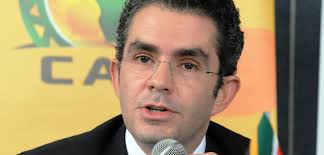By Andrew Warshaw in Marrakesh
March 27 – There’s no doubting Hicham El Amrani’s passion and self-belief. Or that the CEO of Morocco’s 2026 World Cup bid is extremely well connected.
Both are vital attributes in his country’s efforts to upset the odds and land FIFA’s showpiece competition at the fifth timing of asking. But whether they will be enough to secure the 104 votes needed to beat the favoured North American bid is an entirely different matter.
One of FIFA’s strict mandates to the bidders as momentum builds towards the vote in June is that neither should cast judgement on the other. As a result El Amrani is not prepared to discuss the global perception of the Donald Trump regime or wade into the debate about the potential geo-political impact on FIFA’s voting members.
“Whatever is happening around the world, of course we are aware of it,” says El Amrani diplomatically. “But it’s not part of our strategy. We are focussing on our key strengths as a solid candidate even now there will be 48 teams – compactness and diversity.”
Yet by pointing out his own team’s credentials, the highly skilled El Amrani indirectly compares Morocco with the US-Canada-Mexico joint initiative. And near the top of that list is Morocco’s affordability.
“Very often the World Cup gives the impression it has become an elitist competition which, if you don’t have enough money in your pocket you can’t afford,” El Amrani told an international briefing. “It’s a great opportunity for fans to experience the tournament regardless of budget.”
Having lost four previous bids, Morocco is in a different place this time, he argues, even though the odds are stacked against the north African country. Tourism has multiplied, so have hotels and airports. Terrorism, the elephant in the room, is virtually non-existent, he stresses, the only incident of note having taken place in 2011.
Having worked for the Asian Football Confederation for five years before playing a prominent role in his own African confederation – first as deputy general secretary, then for seven years as general secretary – he has a contacts book as long as your arm. It could prove vital in the weeks and months leading up to the vote as he lobbies intensively for votes outside his own continent.
Europe’s support – or a large part of it – is likely to be pivotal for Morocco to stand a chance and El Amrani says there are strong reasons why this could happen, not least when it comes to TV rights. Hence Morocco’s emphasis on having an ideal time zone with palatable kickoff times.
“The European market accounts for about half of the TV rights package. Two-thirds of the money FIFA gets from the World Cup comes from those TV rights. It’s a reality that Morocco offers a strong advantage to FIFA in terms of (TV) audiences.”
He talks a good game but can another Qatar-style upset really happen? After all, Africa staged the World Cup in 2010 and North America has not had it since 1994. “I don’t accept this is the wrong time for us,” counters El Amrani whose country in all probability may not get another chance to bid until 2038. “Mexico have organised twice. Give a chance to other nations in the emerging world.
“We are not saying we could do it now but we’ll be ready in 2026. This is our fifth time. We find it hard to understand that the opportunity is only given to countries that have already had the honour.”
Contact the writer of this story at moc.l1734979684labto1734979684ofdlr1734979684owedi1734979684sni@w1734979684ahsra1734979684w.wer1734979684dna1734979684

